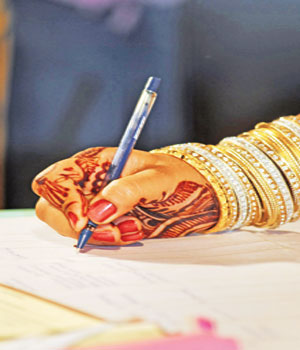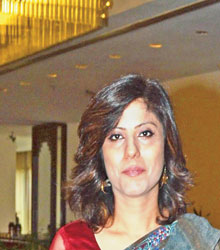Hindu Marriage Bill has finally been passed but many people have reservations. You! takes a look...
After more than six decades the much awaited
Hindu Marriage Bill has finally been passed but many
people have reservations. You! takes a look...
The month of February (2016) turned out to be a historic one as far as the non-Muslim Pakistanis were concerned. Earlier in February, the National Assembly’s Standing Committee on Law and Justice passed the final draft of the Hindu Marriage Bill 2015. This was followed by resolutions passed by the provincial assemblies of Balochistan and Khyber-Pakhtunkwa.

However, shortly after the National Assembly’s Standing Committee passed the draft, Sindh Assembly also passed the Sindh Hindu Marriage Bill, 2016 - which will become operational in three months. Doing so Sindh has become the first province to pass such a bill in Pakistan.
Under the Sindh Marriage Law, Pakistani Hindus as well as the other non-Muslim Pakistanis - Sikhs and Zoroastrians, Buddhists and Jains - can register their marriages.
It took 67 years for such a bill to be passed, and it may prove to be a breather for Pakistan’s Hindu population of 3.3 million. On the surface, many important problems will be resolved, but there are some serious reservations from various quarters. Earlier, when the marriages were not registered, people, especially women were unable to make official documents. Women were unable to apply for computerised national ID cards and passports, and they couldn’t enjoy their right for inheritance. Also they were unable to seek divorce.
There is hope that after the passing of this bill, these problems will be resolved. However, the Sindh Marriage Law has fallen short of the expectations of some people of the Hindu community. They claim that the government should have used this opportunity to target the serious problems faced by this community, but unfortunately the government has only touched some of the issues.
According to political worker and human rights activist Dr Jaipal Chhabria, ‘The Sindh Hindu Marriage Bill, 2016’ is a registration bill and it should not be called a
marriage law nor should it be considered a family law. “It is unfortunate that after so many decades a bill has become a law which still does not include many important points.

Dr Jaipal
“It was not a hard task to come up with a complete bill since there was no opposition to this bill - PPP had the support of the other parties as well, which is why the PPP government should have given a comprehensive bill. It is sad that PPP claims to be sincere to the cause of non-Muslims but it failed to provide non-Muslims with their rights,” informs Dr. Jaipal.
Applauding the Prime Minister and his government, Jaipal says, “Compared to PPP, Nawaz Sharif’s government is considered to be conservative and a right-wing party, but it has proved itself better and stronger compared to the other parties. It is under this government that such steps are being taken.”
“It is disappointing that ‘progressive’ thinking people have not raised their voices for non-Muslims; no one is standing with us and highlighting our reservations on the clauses of the bill,” laments Jaipal.
On one point of this bill, which says that a ‘marriage will be annulled if any one of the partners converts to another religion’ Dr. Jaipal states, “We still have reservations about this bill including the point where a person cannot remarry without divorce or permission from the first wife, as Muslims are allowed. According to law, Muslim men have to seek the permission of their first wives if they wish to remarry or they have the option to divorce.
“Hindus should also be given this provision as when an adult remarries or divorces, the fate and future of minor children is involved. If a mother changes her religion and remarries, the child should be allowed to remain in his first religion and only decide which religion he/she wants to follow at the age of 18,” he adds.

Erum Javed
Regarding the Hindu Marriage Bill 2015, Human Rights Activist Erum Javed, is of the view that there should be uniform family laws that include all citizens of Pakistan. “Passing of this law is a good step - it was a much needed law that should have been made long ago - and we appreciate it even though it took so many years. But we have some reservations regarding certain points in the law. For example, if a Hindu man wants to remarry, he usually converts to Islam for a day and reverts to his religion later. However, if his wife is strong and takes a stand and reports this marriage at the police station the man will be charged with adultery. Adultery because there is no second marriage in Hinduism. And when he reverts to his original religion he can be charged with apostasy and even blasphemy,” she explains.
This legislation is a good one but it is only for marriage registrations which help in making official documents for travel etc. “Certain important points should have been added like separation and divorce to protect the rights of man or woman if they wanted to get out of a marriage,” stresses Ms Javed.
One clause is causing a lot of concern: Clause 12 (iii). This clause states that a marriage will be annulled if any one of the partners converts to another religion. Those opposing this clause fear that it can be misused to forcibly convert non-Muslim women for marriage. Reportedly, there have been several cases in which non-Muslims, especially Hindu women and even under-aged girls have been forced into marriage after forced conversion.

Kelash Kumar
According to Kelash Kumar Sarhadi who is Peace Ambassador, MasterPeace Pakistan, “The government has taken an excellent initiative but I am not satisfied with clause 12(iii) which states that a marriage will be annulled if any of the spouses converts to another religion.”
Even though, the government has actually taken the effort to pass this much needed bill, many other important points should have also been included in this. “The law should have also included an inheritance law for woman however India gives them the right to inheritance. Maintenance should also be given to widow or divorcee; and the widow should also be given the right to remarry - we have to separate state and religion in many things. And then if the largest Hindu country India allows women these rights, why are we depriving them?” shares Ms Javed.
“Family laws should be uniform for all people regardless of their religion. There should be a uniform nikahnama to be used by all which should give separate columns for different religions where they can select the options they want,” concludes Ms. Javed.
Salient features of the bill